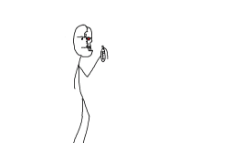What on Earth is cyberpunk? I really have no fucking clue.
/cyb/ - Cyberpunk Fiction and Fact
Cyberpunk is the idea that technology will condemn us to a future of totalitarian nightmares here you can discuss recent events and how technology has been used to facilitate greater control by the elites, or works of fiction
Archived thread
Anonymous
No.149
Anonymous
No.150
high tech, low life.
Anonymous
No.151
sarah catfish?
Cyberpunk was briefly a "movement" in literary science fiction, back in the last century when everything was printed on dead trees. It started around 1980 and lasted around six years and involved a handful of authors:
Bruce Sterling
William Gibson
Rudy Rucker
Pat Cadigan
John Shirley
Just about all of these people were Canadian acid-casualties, hippies who hated America, Americans, capitalism, and President Reagan, and who were terrified that he was going to blow up the world, or get us all enslaved by Them Evil Japs, or Them Evil Wall Street Sheenies, or all three simultaneously. It came through in everything they wrote.
Most of the early c-punk stuff was short stories written by Gibson and Rucker that got printed as filler in between poorly written, sensationalized Sunday-supplement level "SCIENCE!" articles in a shiny-paper deadtree magazine called "OMNI" in the early 1980s. Stuff like "Burning Chrome" and "Tales of Houdini."
All of it was experimental. All of it was either blackly humorless grimderp verging on self-parody or absolutely bleak in tone, uniformly in nightmarishly dystopian settings where the world was owned by ruthless Japanese corporations, and most the settings included nuclear war and/or global ecological collapse as part of the backstory. Just about all of them were about mohawk-wearing Rebels Against the System who usually had big clunky cybernetic prosthetic arms, who normally had mirrorshades, scuffed black leather jackets, or both, either dying pointlessly or running for their lives through the neon-lit gutters from Space Yakuza Ninja assassins. The countryside doesn't exist. No one ever sees a tree or a flower or stands with his boots touching earth instead of concrete, nor ever did.
As a "movement," it was over not long after Ronald Reagan was elected for his second term, and the original material really hasn't aged well. This despite the term continuing as a genre description down to the present day, which carries a connotation of a retro-futuristic mashup punk rawk/film noir setting full of of l33t h4x0r types with Ethernet jacks surgically wired into their brains, in the centers of their foreheads, and their buddies, hulking strong silent type gengineered cyborg'd-out killing machines with robot hands that have knives that pop out of them, that they were in Special Forces with in The War.
Sterling wrote, as this genre was shaping up to turn into something of an embarrassment for him in the early 90s, that c-punk wasn't about the cranial jacks or the mirrorshades, it was about what it would be like to live in a collapsing dystopian future in which baby-eating hypercapitalism had eaten the world alive, science was pursued solely for profit and all caution or human decency abandoned, and Frankenstein's Monster was not only loose but looking back at us from the mirror, and the Bomb, THE BOOOOOOOOOOOOMB, is hanging over all our heads like some kind of horrible robotified sword-o-Damocles, I tell you what.
Now it is remembered mainly as the progenitor of "steampunk," which is this extremely silly attempt to marry the film-noir-1970s-punx-wif-mohawks feeling with really implausible Jules-Verne-ish adventure stories involving clockwork robo-golems with big brass gears sticking out of their heads, and everyone wears a corset, including the guys. I suspect the future will find it even sillier than c-punk.
Bruce Sterling
William Gibson
Rudy Rucker
Pat Cadigan
John Shirley
Just about all of these people were Canadian acid-casualties, hippies who hated America, Americans, capitalism, and President Reagan, and who were terrified that he was going to blow up the world, or get us all enslaved by Them Evil Japs, or Them Evil Wall Street Sheenies, or all three simultaneously. It came through in everything they wrote.
Most of the early c-punk stuff was short stories written by Gibson and Rucker that got printed as filler in between poorly written, sensationalized Sunday-supplement level "SCIENCE!" articles in a shiny-paper deadtree magazine called "OMNI" in the early 1980s. Stuff like "Burning Chrome" and "Tales of Houdini."
All of it was experimental. All of it was either blackly humorless grimderp verging on self-parody or absolutely bleak in tone, uniformly in nightmarishly dystopian settings where the world was owned by ruthless Japanese corporations, and most the settings included nuclear war and/or global ecological collapse as part of the backstory. Just about all of them were about mohawk-wearing Rebels Against the System who usually had big clunky cybernetic prosthetic arms, who normally had mirrorshades, scuffed black leather jackets, or both, either dying pointlessly or running for their lives through the neon-lit gutters from Space Yakuza Ninja assassins. The countryside doesn't exist. No one ever sees a tree or a flower or stands with his boots touching earth instead of concrete, nor ever did.
As a "movement," it was over not long after Ronald Reagan was elected for his second term, and the original material really hasn't aged well. This despite the term continuing as a genre description down to the present day, which carries a connotation of a retro-futuristic mashup punk rawk/film noir setting full of of l33t h4x0r types with Ethernet jacks surgically wired into their brains, in the centers of their foreheads, and their buddies, hulking strong silent type gengineered cyborg'd-out killing machines with robot hands that have knives that pop out of them, that they were in Special Forces with in The War.
Sterling wrote, as this genre was shaping up to turn into something of an embarrassment for him in the early 90s, that c-punk wasn't about the cranial jacks or the mirrorshades, it was about what it would be like to live in a collapsing dystopian future in which baby-eating hypercapitalism had eaten the world alive, science was pursued solely for profit and all caution or human decency abandoned, and Frankenstein's Monster was not only loose but looking back at us from the mirror, and the Bomb, THE BOOOOOOOOOOOOMB, is hanging over all our heads like some kind of horrible robotified sword-o-Damocles, I tell you what.
Now it is remembered mainly as the progenitor of "steampunk," which is this extremely silly attempt to marry the film-noir-1970s-punx-wif-mohawks feeling with really implausible Jules-Verne-ish adventure stories involving clockwork robo-golems with big brass gears sticking out of their heads, and everyone wears a corset, including the guys. I suspect the future will find it even sillier than c-punk.
4 replies | 2 files | 5 UUIDs | Archived


 Ex: Type :littlepip: to add Littlepip
Ex: Type :littlepip: to add Littlepip  Ex: Type :eqg-rarity: to add EqG Rarity
Ex: Type :eqg-rarity: to add EqG Rarity 